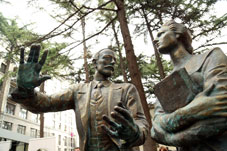
Oliver and Marjory Wardrop’s monument unveiled in Tbilisi
By Messenger Staff
Wednesday, October 21
Georgia honoured the British siblings Oliver and Marjory Wardrop through the opening of a square named after them last year, and now another accolade has been bestowed on their memory in the form of a special monument in central Tbilisi, near Georgia’s Parliament building.
The festive opening ceremony of the monument of Oliver and Marjory Wardrop, the people who did their utmost to promote Georgia’s statehood, culture and literature inside the country and abroad during the last century, was held as part of the Tbilisoba event last weekend.
Tbilisi's Mayor Davit Narmania, Parliament Speaker Davit Usupashvili, Head of Tbilisi City Council Giorgi Alibegashvili, the British Ambassador to Georgia Alexandra Hall Hall and other foreign and local officials attended the occasion at Chitandze street, in the square named after the Wardrop.
“Last year when we opened the square I promised the construction of a monument to these special people who promoted Georgian history and diplomacy,” Narmania said.
The bronze monument, created by sculptor Jumber Jikia ((who had won the tender announced by Tbilisi City Hall), revealed a walking imitation of the brother and sister in the square.
“The merit of these people to Georgia is immense. The current Georgian-British cultural, diplomatic, social and other positive relations took root owing to Oliver Wardrop’s activities,” Narmania added.
Sir John Oliver Wardrop was a British diplomat, traveller and translator, primarily known as the United Kingdom's first Chief Commissioner of Transcaucasus in Georgia, 1919–21, and also as the founder and benefactor of Kartvelian studies at Oxford University in the United Kingdom.
After travelling to Georgia (then part of Imperial Russia) in 1887, O. Wardrop wrote his study The Kingdom of Georgia, published in 1888.
In 1894, during his second journey to Georgia, he mastered the Georgian language and published a series of books on Georgia, including his translation of Sulkhan-Saba Orbeliani’s The Book of Wisdom and Lies.
In July 1919, the British Foreign Secretary Lord Curzon offered O. Wardrop the post of the first British Chief Commissioner of the Transcaucasus in Tbilisi.
O. Wardrop, a capable diplomat, tried to promote Georgian culture and gather all the support from the West for the newly-formed country under the threat of Bolshevik aggression.
However, in February 1921 Soviet Russia's Red Army invaded Georgia, putting an end to the short-lived democratic republic.
In England, Wardrop organised the set-up of the Georgian Society and the Georgian Committee in London. In 1930, along with W.E.D. Allen, he formed the Georgian Historical Society which published its own journal Georgica.
His sister, Marjory Wardrop, translated (prosaically) the 12th century Georgian epical poem by Shota Rustaveli, The Knight in the Panther's Skin into English.


